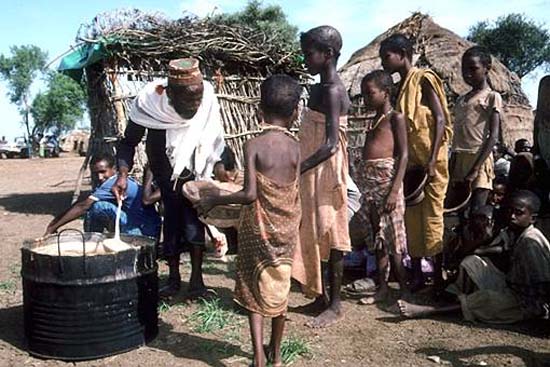 Somalia has been consumed by violence and power struggles since it broke its colonial ties to Italy and Britain back in 1960. Somalia has faced continual internal strife as warring factions battle for power. In addition to the internal chaos, Somalia has had a difficult relationship with neighboring Ethiopia, going back over four decades. As in most regions of Africa, the post-colonial borders were drawn very rapidly and often led to hotly contentious geographic battles between neighboring countries.
Somalia has been consumed by violence and power struggles since it broke its colonial ties to Italy and Britain back in 1960. Somalia has faced continual internal strife as warring factions battle for power. In addition to the internal chaos, Somalia has had a difficult relationship with neighboring Ethiopia, going back over four decades. As in most regions of Africa, the post-colonial borders were drawn very rapidly and often led to hotly contentious geographic battles between neighboring countries.
As of recent, the Ethiopian government has actively engaged in helping the transitional Somali leadership to combat the Islamist-led insurgency. The Somali government has very little military strength and often relies on the more advanced Ethiopian military.
This weekend saw a flare up in the violence. Al Jazeera News reports that 81 have died in violent clashes in the country's capital, Mogadishu. Local residents of Mogadishu became angered with the Ethiopian-backed transitional government today, when 10 were found dead inside a Somali moque. BBC News reports:
Six of the dead are religious leaders from the Tabliq Sufi sect, which is not involved in the conflict.When you couple the ongoing violence with the current food crisis, Somalia faces humanitarian catastrophe. The Guardian reports:
Prime Minister Nur Hassan Hussein says the government was defending itself during the weekend clashes.
But locals accused the Ethiopians of shelling the residential areas of Hurwa and Yaqshid in north-eastern Mogadishu, after they came under attack.
Among those killed was a seven-year-old girl, while a local resident said he had seen the bodies of two Ethiopians and one government soldier.
"The government is sorry about the fighting and loss of innocent civilian lives," Somalia's prime minister said on Sunday.
"Our aim is to restore law and order through reconciliation and peaceful means, but that does not mean our troops and those of our ally Ethiopia will not defend themselves as they come under constant attack."
The UN says that more than half of Mogadishu's population has fled recent fighting in the city.
The Ethiopians intervened in 2006 to help government forces oust Islamists who had taken control of much of southern Somalia.
The country has not had an effective national government since 1991.
Crisis, emergency, disaster; words used liberally over the past 17 years that Somalia has been without a government. But most Somalia experts agree: things have never been this bad.Just a reminder, while there is no evidence US was involved in any of the weekends events, the US military has played a rather significant role in the country over the last couple years:
A brutal guerrilla war, three years of drought, hyperinflation and restricted aid agency access that compares only to Iraq have pushed the country to the brink. Philippe Lazzarini, the UN's head of humanitarian affairs for Somalia, this week said that a "massive, massive crisis" was brewing, with 2.5 million people needing food or other assistance.
"We are on the eve of what triggered the massive international intervention [the disastrous US-led relief operation] in 1992," he said.
Asha Haji Elmi, who heads the Mogadishu-based Save Somali Women and Children project, said the humanitarian need and security situation was "unprecedented", with a complete culture of impunity among all sides to the conflict.
Dennis McNamara, who works at the Swiss-based Centre for Humanitarian Dialogue, said a new international approach was needed to help a country that was "beyond a failed state". All the warring parties, including the Islamist "Al Shabab" movement, recently given terrorist status by the US, need to be engaged.
"Somalia has been in the international community's 'too hard to solve' basket for more than a decade," said McNamara. "Unless we act now it is headed towards the catastrophe basket as well."
Jan. 9, 2007: U.S. Strikes In Somalia Reportedly Kill 31
June 2, 2007: US 'bombs Somali targets'
March 3, 2008: US bombs Islamist town in Somalia
No comments:
Post a Comment